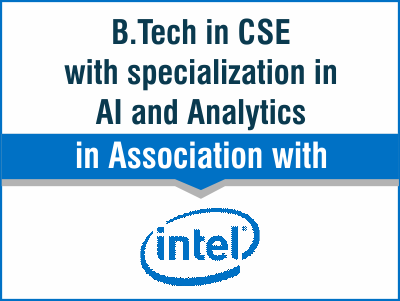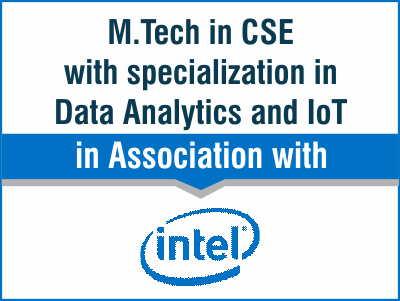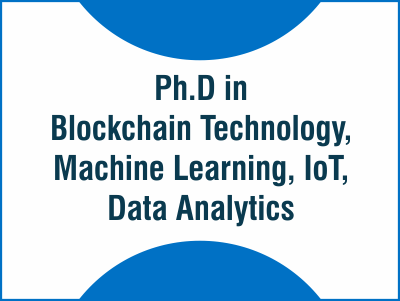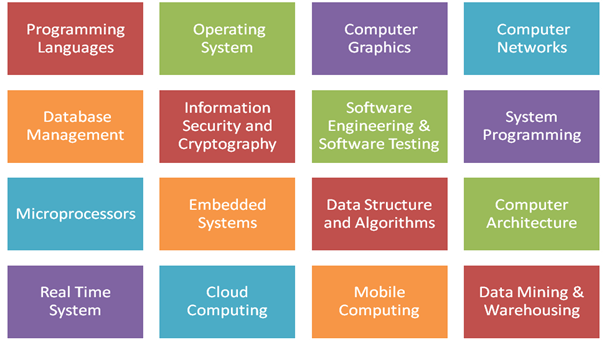
The Department of Computer Science and Engineering at OP Jindal University imparts quality education at undergraduate and post graduate level with emphasis on basic computing principles, rapidly evolving technology, and continuous need for innovation in this field. To ensure that students are sought by IT companies, the department provides training in various cutting edge technologies, inculcate professional behavior, instill ethical values and develop leadership and team working capabilities. Our program provides flexible curriculum enabling the students to achieve their goals and make them industry ready.
Department has experienced and energetic faculty with specialization in different areas like Computer networks, Embedded and IoT, Artificial Intelligence, Data Mining etc. Department has got state of the art laboratories, latest hardware-software and teaching learning tools to create a learning environment and impart quality education.



| S. No. | Volume | Issue | Link |
|---|---|---|---|
| 1. | I | I | Download |
| 2. | I | II | Download |
| 3. | I | III | Download |
| S. No. | Duration | Link |
|---|---|---|
| 1. | April - June 2023 | Download |
| 2. | July - September 2023 | Download |
| 3. | January - March 2024 | Download |
Many students in India and abroad choose to study Computer Science because of the bright career prospects. Students studying this discipline learn technical skills such as programming, problem-solving, leadership, and many more. From schools to hospitals and financial companies, computer science has its role everywhere. With the high demand of computer science and technology in the industry, B.Tech Computer Science and Engineering courses have gained potential which land students in various positions- Systems Analyst, Web Developer, Finance Programmer, Software Engineer, Product Manager, Game Developer, and many more.
Benefits of Studying Computer Science & Engineering
Unique Industry Linked Curriculum for CSE from the very first year with stress on "Learning by Doing". New curriculum has got 40 % Theory and 60% Practicals. (Find attached - First year curriculum)
Each semester has a subject related to AI and Analytics and will be taught by Intel Partner trainer. Physical classes of one week (40 hrs) will be followed by online mentoring and hands-on practice/projects/case studies.
At the end of each semester students will appear for a certification exam and will be awarded with the Intel certification for the said course.
Provision for Internships / case studies in every year and entire final year is meant for projects/Internships.
Introduction of High Growth Industry Domains as Elective Theory and Labs for better Internship opportunities like BFSI, Retail Management, Digital Marketing etc.
Introduction of MOOCS, Interdisciplinary Sciences, Entrepreneurships etc for personality development and pursuing passion.
OPJU will set-up an Intel Center of Excellence for Industry 4.0 and will establish an Intel High Performance Computing Lab. This will help in live projects and research related to AI, ML, Analytics, Big Data, Blockchain etc.
Students will get an opportunity to participate in various national / international events conducted by Intel partners.
Intel Education partner FICE will help students get access to long term internships in partner companies.
Specialization on cutting edge technology like Data and Analytics and IoT to make them industry Ready.
The curriculum covers areas that prepare students for most lucrative careers in the space of Data Science, Data Engineering and Advanced Analytics, IoT.
Contact-less and safe Online study materials, exams facility and mentoring.
Curriculum has been developed with the orientation towards industry 4.0 and smart manufacturing.
OPJU will set-up an Intel Center of Excellence for Industry 4.0 and will establish an Intel High Performance Computing Lab. This will help in live projects and research related to AI, ML, Analytics, Big Data etc.
The Dissertation/Project in the final semester enables students to apply concepts and techniques learnt during the programme
Assured industry internship/placements in various MNCs during final year
Certified course on latest technology like Big Data Analytics, Cloud Technology, Machine Learning, IoT in association with companies like Intel, Microsoft,IBM etc.
The Department’s Teaching Learning aims at enabling students to face real-world challenges using Problem-Based Learning (PBL), interactive and participative processes and constant mentoring.
NPTEL Student Chapter
ACM Student Chapter
IEEE student Chapter
CSI student chapter
UNICODE (Union of Computer Department for Excellence)
Android Club
IUCEE (Indo Universal Colloboration for Engineering Education)
Industry Visits
Programming and Problem-solving Contests
Projects and Quiz Competitions
Students Seminars and Debates
Interviews and Group Discussions
Team-building Exercises
O2C2 (OPJU Open Coding Competetion)
Webinar Conductions
In house Training program
Department researchers are working extensively in some of the thrust areas like Digital Image Processing, Data Science, Machine Learing, Cloud Computing, IoT etc. . Department has collaborated with leading Industries and renowned institutes across the India. Students along with the teachers constantly involved in exciting and interesting problems/projects to explore and innovate new methods and finding sustainable solutions, published in various national and international journals.
Key Research Area:
Big Data
Internet of Things
Cloud Computing
Network Security
Machine Learning
Digital Image Processing
A webinar was conducted by alumnus of CSE department on 20/10/2020 at 5 PM under the OPJU-IEEE student chapter. Five students of the 2020 batch successfully placed in top-notch software companies viz. Raj Kapish Gupta(TCS), Aman Patel(TCS and Wipro), Thakur Rupak Singh(IBM and TCS), Kanishk(Wipro), Vinit(Wipro), mentored junior students about technical and interview skills required to crack a placement exam and gave them tips for entry into a good software company. It was a fruitful session where students from final year and pre-final year found the session informative for their upcoming placement drives.
OP Jindal University Raigarh in association with IEEE Bombay Section conducted "OPJU IEEE Tech Web Series" a series of webinars with the aim to connect industry professionals, academia and students together to get an insight of the future technological trends. The series was presided over by eminent invitee speakers viz. Dr. Ashutosh Dutta from Johns Hopkins University, Dr. Ravi Prakash from University of Texas at Dallas, Dr. Xavier Fernando from Ryerson University, Canada, Dr. PS Bokare, Dr. Saraju Mohanty from University of North Texas, USA, Mr. Mrityunjay Singh from Infosys, Mr. Saurabh Ganeriwala from Jindal Group, Mr. Atul Arya from Panasonic, Mr. Bhavesh Kumar from SIMULIA, Mr. Raghunandan Bokare from OakNorth Bank, Bengaluru, Mr. Kanishk Gaur from India Future Foundation, Gurugram on upcoming topics in technology. We received huge participation in these webinars from across the country and abroad.
The CSE Department successfully conducted zonal level competition at University in which 4 out of 6 teams selected for participation in idea submission for final round.
The faculty of CSE department conducted various short-term trainings for students and faculty on Machine Learning and Python for Data Analytics. A training program for students on Machine Learning was conducted by Prof. Manish Bhagwani in the month of June and a short-term FDP was conducted by Dr. Gurveen Vaseer on Python for Data Analytics in the month of July. The learners were appraised of these upcoming technologies with hands-on learning.
To promote innovation centric education and perform cutting edge research in Computer Science & Engineering.
Empower students to be successful, effective problem-solvers, life long learners, ethical and positive contributors towards social and economic upliftment of the nation.
Learning by doing is the driving philosophy of the department. The Department has state of the art laboratories, latest hardware-software, round the clock internet connectivity and much more to support teaching –learning. The laboratories are well equipped with LMS system to make lab sessions and learning more effective. Following is a list of different laboratories :
Intel Intelligent Systems Lab in partenership with Intel Inc and FICE.
Android and App Devloment Lab
Cloud Computing Lab
Internet Technology Lab
Software Engineering Lab
Artificial Intelligence Lab
Mobile Computing Lab
Computer Networks and Network Security Lab
Data Structure and Programming Lab
LAMP Lab
Soft Computing Lab
Big Data Analytics & Machine Learning Lab
J2EE and Dot Net Lab
Hardware Simulation Lab
DBMS Lab
IoT Lab

| 1st Semester | |
|---|---|
| Subject Code | Subject |
| SOS-B-MAT-23-101 | Engg. Mathematics-1 (Matrices and Linear Algebra) |
| SOE-B-CSE-23-102 | Digital System Design |
| SOE-B-EE-23-103 | Basic Electrical & Electronics |
| SOE-B-CSE-23-104 | Basic Computation SKills (C-Programming) |
| SOE-B-CSE-23-105 | Computer Fundamentals |
| SOS-B-HUM-23-106 | Communicative English |
| SOE-B-CIV-23-107 | Environmental Sc. |
| SOE-B-EE-23-108 | Basic Electrical & Electronics Lab |
| SOE-B-CSE-23-109 | Basic Computation SKills (C-Programming) Lab) |
| SOE-B-CSE-23-110 | Digital System Design Lab |
| SOE-B-CSE-23-111 | Computer Fundamentals Lab |
| 2nd Semester | |
|---|---|
| Subject Code | Subject |
| SOS-B-MAT-23-201 | Calculus and Differential Equation |
| SOE-B-CSE-23-202 | Data Structures |
| SOE-B-CSE-23-203 | Comp. Organization and Architecture |
| SOE-B-CSE-23-204 | IT Workshop |
| SOE-B-CSE-23-205 | Python Programming |
| SOS-B-HUM-23-206 | Indian Knowledge System |
| SOM-B-MBA-23-207 | Problem Solving Design Thinking |
| SOE-B-CSE-23-208 | Data Structures Lab |
| SOE-B-CSE-23-209 | Python Programming Lab |
| SOE-B-CSE-23-210 | Universal Human Values |